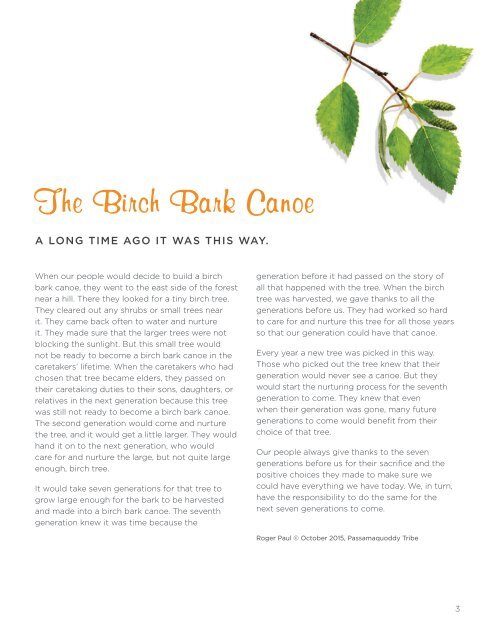Stories and Poems for Northeastern Native Tribal Families: From A Circle Tied to Mother Earth
Native Stories and Guidance to Promote Health and Prevent Substance Abuse
Native Stories and Guidance to Promote Health and Prevent Substance Abuse
You also want an ePaper? Increase the reach of your titles
YUMPU automatically turns print PDFs into web optimized ePapers that Google loves.
The Birch Bark Canoe<br />
A LONG TIME AGO IT WAS THIS WAY.<br />
When our people would decide <strong>to</strong> build a birch<br />
bark canoe, they went <strong>to</strong> the east side of the <strong>for</strong>est<br />
near a hill. There they looked <strong>for</strong> a tiny birch tree.<br />
They cleared out any shrubs or small trees near<br />
it. They came back often <strong>to</strong> water <strong>and</strong> nurture<br />
it. They made sure that the larger trees were not<br />
blocking the sunlight. But this small tree would<br />
not be ready <strong>to</strong> become a birch bark canoe in the<br />
caretakers’ lifetime. When the caretakers who had<br />
chosen that tree became elders, they passed on<br />
their caretaking duties <strong>to</strong> their sons, daughters, or<br />
relatives in the next generation because this tree<br />
was still not ready <strong>to</strong> become a birch bark canoe.<br />
The second generation would come <strong>and</strong> nurture<br />
the tree, <strong>and</strong> it would get a little larger. They would<br />
h<strong>and</strong> it on <strong>to</strong> the next generation, who would<br />
care <strong>for</strong> <strong>and</strong> nurture the large, but not quite large<br />
enough, birch tree.<br />
It would take seven generations <strong>for</strong> that tree <strong>to</strong><br />
grow large enough <strong>for</strong> the bark <strong>to</strong> be harvested<br />
<strong>and</strong> made in<strong>to</strong> a birch bark canoe. The seventh<br />
generation knew it was time because the<br />
generation be<strong>for</strong>e it had passed on the s<strong>to</strong>ry of<br />
all that happened with the tree. When the birch<br />
tree was harvested, we gave thanks <strong>to</strong> all the<br />
generations be<strong>for</strong>e us. They had worked so hard<br />
<strong>to</strong> care <strong>for</strong> <strong>and</strong> nurture this tree <strong>for</strong> all those years<br />
so that our generation could have that canoe.<br />
Every year a new tree was picked in this way.<br />
Those who picked out the tree knew that their<br />
generation would never see a canoe. But they<br />
would start the nurturing process <strong>for</strong> the seventh<br />
generation <strong>to</strong> come. They knew that even<br />
when their generation was gone, many future<br />
generations <strong>to</strong> come would benefit from their<br />
choice of that tree.<br />
Our people always give thanks <strong>to</strong> the seven<br />
generations be<strong>for</strong>e us <strong>for</strong> their sacrifice <strong>and</strong> the<br />
positive choices they made <strong>to</strong> make sure we<br />
could have everything we have <strong>to</strong>day. We, in turn,<br />
have the responsibility <strong>to</strong> do the same <strong>for</strong> the<br />
next seven generations <strong>to</strong> come.<br />
Roger Paul © Oc<strong>to</strong>ber 2015, Passamaquoddy Tribe<br />
3


















